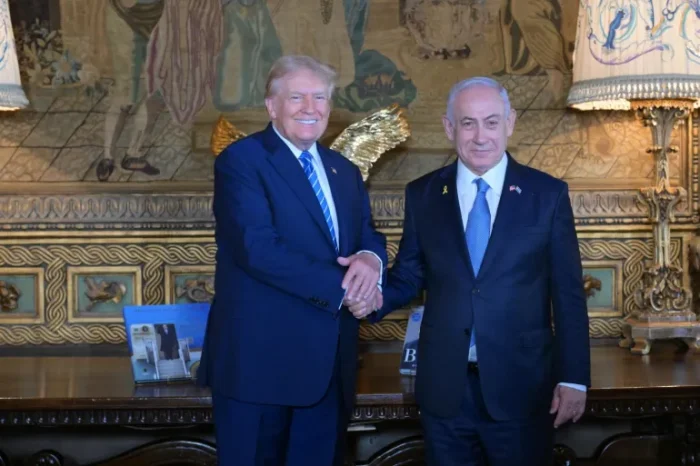The return of Donald Trump to the White House has sparked celebrations among Israel’s far-right leaders, signaling a potentially volatile shift in the dynamics of the Middle East conflict. With his victory, Israel’s Prime Minister Benjamin Netanyahu and his allies anticipate a resurgence of the uncritical support that marked Trump’s first term, a stark contrast to the more restrained approach of the Biden administration.
Israeli Reaction: Enthusiasm Among Far-Right Leaders
Itamar Ben-Gvir, Israel’s far-right National Security Minister, was quick to express his excitement on social media, tweeting a resounding “Yesssss” along with emojis of a flexing bicep and the flags of Israel and the United States. Netanyahu, the first world leader to congratulate Trump, highlighted the victory as a reaffirmation of the strong alliance between the two nations.
Polls conducted by the Israel Democracy Institute ahead of the election revealed widespread Israeli support for Trump, with 65% preferring him over Vice President Kamala Harris. The preference was even higher among Jewish Israelis, reaching 72%, reflecting a shift towards stronger alignment with the Republican Party, particularly among right-wing constituencies.
A New Chapter for U.S.-Israel Relations
Trump’s previous tenure as president was marked by unprecedented support for Israel’s territorial claims, including:
- Recognition of Jerusalem as Israel’s capital, followed by the relocation of the U.S. embassy.
- Endorsement of Israel’s sovereignty over the Golan Heights, territory captured from Syria.
- Facilitation of the Abraham Accords, normalizing relations between Israel and several Arab states, including the UAE, Bahrain, Morocco, and Sudan.
Netanyahu’s recent visit to Trump’s Florida estate, Mar-a-Lago, underscored the close personal and political ties between the two leaders. Analysts believe that Netanyahu’s gamble of aligning closely with Trump has paid off, setting the stage for a renewed partnership.
Implications for Gaza and the Two-State Solution
Analysts warn that Trump’s return to power could spell a “slaughter as usual” scenario for Gaza and Lebanon. Independent political scientist Ori Goldberg argues that both Trump and Netanyahu share a “genocidal agenda”, marked by disregard for progressive values and international norms. This, he suggests, could lead to an escalation of violence, particularly in the ongoing conflicts in Gaza and against Hezbollah in Lebanon.
Goldberg, however, notes that while Trump’s rhetoric is aggressive, his practical support may be limited to financial and military aid rather than direct military involvement. Trump has previously touted his anti-war stance, and it remains uncertain whether he would sanction U.S. military intervention.
In Gaza, the Biden administration’s red lines, including its call for limited Israeli action and demands for humanitarian aid access, have created friction with Netanyahu’s government. With Trump back in power, analysts fear there may be less restraint on Israel’s military operations, exacerbating the humanitarian crisis in the region.

End of the Two-State Solution?
The prospect of a two-state solution, a cornerstone of U.S. foreign policy since the Oslo Accords, is now in greater jeopardy. Trump’s stance during his first term leaned towards solidifying Israeli control over the West Bank, including recognition of its settlements and denying the right of return for Palestinian refugees. His so-called “deal of the century” was criticized for resembling an Israeli wish list rather than a balanced peace plan.
Independent analyst Nimrod Flaschenberg argues that Netanyahu and his right-wing coalition may view Trump’s election as a final blow to the two-state solution, paving the way for increased annexation and settlement activity in the West Bank.

A Tense Road Ahead
The election result is seen as a major win for Netanyahu, who has faced mounting domestic and international pressure over the ongoing war in Gaza. With Trump’s uncritical support, Netanyahu is likely to feel emboldened, despite the humanitarian outcry and demands for a ceasefire.
However, Goldberg warns that Netanyahu may be overestimating Trump’s loyalty and willingness to engage in the region’s conflicts. While financial and military aid may flow, Trump’s reluctance to commit U.S. troops could limit the extent of practical support.
In the immediate future, the political landscape is unlikely to change drastically. Goldberg predicts that Netanyahu will continue his aggressive policies, capitalizing on the renewed U.S. backing to maintain his political standing and address domestic challenges.
“For Netanyahu,” Goldberg concludes, “it’s all about making it through to the end of the day.” The outcome for the Palestinian territories, however, is grim, with analysts expecting continued violence and deepening despair as the prospect of a negotiated peace fades further into the background.
The return of Trump marks a watershed moment for U.S.-Israel relations, one that may reshape the Middle East conflict and redefine the scope of international diplomacy in the region. The celebrations among Israel’s far-right are tempered by the grim reality of what may lie ahead: a continuation of the violence and instability that has plagued the region for decades.
To Keep Updated Visit & Follow our Facebook Page Or Our Website




